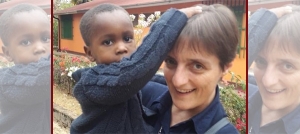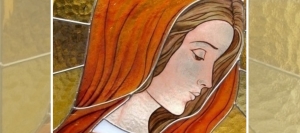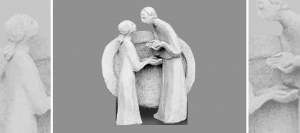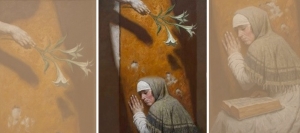Redazione
Fourth Sunday of Advent
The readings for this Fourth Sunday of Advent lead us to the threshold of the mystery of Christmas. Everything revolves around the fulfillment of the promise: God enters definitively into human history and reveals himself as the One who, in fidelity, makes a covenant with his chosen ones.
In a new way, God comes to take up residence, to dwell among us. He is with us always and the home to which he refers is his being with us in the different opportunities that he himself chooses. Israel's patient wait is fulfilled and a new horizon opens up before each person: the fulfillment of the promise.
The Gospel passage offers us wonderful news: in order to be born, God needs humanity, he needs a woman and her womb! And Mary, the young Daughter of Zion, makes herself available so that Love may take flesh and in confident abandonment conceives.
God needs me...you. He calls us to become His house, His womb... to carry Him within us, to guard Him and make Him grow with love. It is beautiful what God asks of us: not to be content with building a place for Him, but to become His house, His dwelling place.
Mary is a small womb that bears this invisible God, this Eternal Beauty, this faithful and tender Love that takes shape and confirms and guards us, precedes and consoles us, heals and saves us.
God comes in the fertility of a maiden who waits, who awaits the redemption of her wounded and lost people. God comes, for whom "nothing is impossible." God fulfills this promise.
This miracle is also possible in us if we make ourselves available, and if we abandon ourselves to the unpredictability of grace.
The Gospel again suggests to us that, if we want to seek God, we must do so here, in this life, simply by living with awareness because to make Himself present, He chose the everyday life of Nazareth.
Life then acquires meaning if we pay attention to what is small, if we bring out the sweetness of the detail, the fineness of the trace, the thoughtfulness of hiddenness.
The evangelist Luke also suggests that God avoids the noise of the temple; he prefers the peripheries of the world: he chooses Galilee, in the extreme north of the Holy Land because he is attracted by the little ones, the poor, the inhabitants of the peripheries.
We speak very often of existential peripheries as places where the presence of God seems obscured and where there is a need for the light of the Gospel, these ever closer places that question us because they are spaces of exclusion. They are also present in our communities, in the depths of our hearts.
Then we discover why Jesus prefers the peripheries: because God enters history from below, he makes a covenant with the poor.
Pope Francis, in his Encyclical Fratelli tutti (n.234) says again, "It is only closeness that makes us friends and allows us to deeply appreciate the values of the poor. The option for the poor must lead us to friendship with the poor."
We can ask ourselves this week: In this pandemic context, what is the periphery that I am called to inhabit? What poverty must I embrace?
Let us make our own the words of this Sunday’s Entrance Antiphon: "Let your dew drop down from on high, O heavens, and from the clouds let the Righteous One descend to us; let the earth be opened and bring forth a Savior."
Yes, Lord, may the earth of our hearts be opened, may space be created to welcome you in this unusual Christmas. May Mary, your Mother, take us by the hand and help us to cleanse our hearts of everything that prevents us from becoming your dwelling place.
Have a good journey…
Third Sunday of the Advent
The Word of God for this Third Sunday of the Advent - Sunday in Gaudete - is a lovely hymn to joy.
We will sing in the entrance antiphon, "Rejoice always in the Lord: I tell you again, rejoice, the Lord is near?
Isaiah will exult: I rejoice fully in the Lord, my soul rejoices in my God.
And in the second reading, Saint Paul exhorts us to be always joyful, to pray unceasingly, giving thanks to God in all things.
These words are a clear sign to us, a strong invitation to awaken from our torpor to fix our gaze on the mystery that is already happening.
The prophet Isaiah announces the coming of a Messiah who will have to "bind up the wounds of the broken-hearted", that is, to restore courage to the disappointed and disheartened: a Messiah whose task will consist in "proclaiming freedom to the slaves and release to the captives".
Let each of us feel profoundly grateful that we have first been clothed with the wedding garment of salvation. We are sinners already forgiven, clothed in divine mercy, by the Blood of Christ that envelops us and gives us dignity and freedom.
Through the incarnation of his Son, God seeks humanity and invites us to a wedding feast, establishing a new and eternal covenant. He is the creator of joy, the creator of the encounter. So let each of us cultivate joy by feeling "as a bridegroom puts on a tiara, and as a bride adorns herself with jewels". (Is 61:10b).
In the Gospel passage we meet John the Baptist, a man sent by God as a witness to the light, a witness to Christ... He denied of himself and became a transparency of the Mystery.
The dominant theme of this page is a question addressed to the baptizer about his identity. His answers are of extraordinary wisdom: in order to define himself, John recognizes himself in the Other. Because the secret of himself is beyond himself and what qualifies each person is that part of the mystery that he carries within, that inhabits him.
An invitation is addressed to us to welcome the Other: God and others as they are, as they reveal themselves, even and especially when they upset our schemes and our expectations. It is the call to make each person a subject to be contemplated, worthy of trust, recognizing him or her in his or her truth, in his or her beauty as a child of God....
Pope Francis, in Encyclical Fratelli tutti expresses it this way: "The culture of encounter implies the habitual capacity to recognize the other's right to be himself and to be different." (n. 218)
So, this week we want to ask ourselves: What do I do to recognize Christ knocking at the door of my heart in the faces of those close to me?
We want to commit ourselves to recognize the other, to recognize the right of others to be different, to be themselves so that we may experience the joy of a new beginning, the desire to communicate Jesus to our neighbors, to recognize Him in others.
Let us allow ourselves to be transformed inwardly in order to experience the joy of Christmas: "May the God of peace sanctify us wholly, and may our whole person, spirit, soul and body, be preserved blameless for the coming of our Lord Jesus Christ!" (1Th 5:23-24).
Mary Immaculate - "Rejoice! Full of grace" (Lk 1:28)
The Solemnity of the Immaculate Conception which we celebrate today invites us to contemplate the beauty and purity of Mary to fill or who fills our lives with light.
Through the Mother of God and our Mother, we are inspired to awaken within us the amazement for a God who comes, comes in our history, comes in our lives, with a love that surpasses all our desires.
Mary's experience takes us back to the root, to the heart, of the Christian experience, which is unspeakable because it is so human that it is divine, a story of communion so intimate between the finite and the Infinite, between flesh and Word...
With the proclamation of the Angel a story begins: the mystery of God's encounter with humanity: the mystery of the boundless Love of God, which breaks into the heart and flesh of a woman....
"Rejoice! Full of grace. The Lord is with you."
Rejoice, Beloved of God, you are no longer alone: He is with you! Words addressed to Mary, but also addressed to each of us, since the Good News of the Gospel has entered our lives. We too are called: "full of grace!” We are all "graced.” It is the essence of our being, our new name, the imprint of our personhood or humanity. And this puts within us so much joy, an infinite joy!
The story of Mary is my story and yours. Again the angel is sent to your home and says to you, “Rejoice, you are full of grace! God is within you and He fills you with life.”
The mystery of the Immaculate Conception is a source of inner light, hope and comfort. In the midst of life's trials and especially the contradictions we experience within us and around us, Mary, Mother of Christ, tells us that grace is greater than sin, that God's mercy is more powerful than evil and can and will transform it into good.
We are encouraged to fix our gaze on the beauty of the Mother of God, and contemplate the transformation brought about by grace while nourishing in our hearts the desire to recover within us the kindness and charm of the Mystery.
Kindness, in fact, fills with light the life not only of the one who receives it, but also of the one who gives it because it brings us into relationship, makes us go beyond the boundaries of ourselves and opens us to deep communion. It creates invisible alliances that dampen loneliness and fill every void.
Pope Francis writes in the Encyclical Fratelli Tutti: "It is still possible to choose to exercise kindness. There are people who do it and become stars in the midst of darkness. Kindness helps others so that their existence is more bearable and is capable of creating a healthy coexistence that generates life." (n. 223)
Then our concrete action is precisely to RECOVER THE KINDNESS.
We can ask ourselves in our prayer: How is grace transforming my life? How is kindness growing within me?
Let us go to Mary's school to welcome the blessed Fruit of her womb.
Let us learn from Mary silence and how to welcome the Word. She suggests to us faith, wonder, hope, and charity. She shows us the way of kindness and beauty because she is, from eternity and forever, the Tota Pulchra.
A blessed day!
Second week - "Speak to the heart of Jerusalem" (Is 40:2)
On this second Sunday of Advent time, the word of God is characterized by a tone of peace and consolation.
The Lord asks: Console, console my people.
God wants our consolation.
In these difficult times, faced with the discouragement that often dwells in our hearts, we receive words that, like balm, heal our deep wounds and allow us to see the miracle of God's presence among us.
We know how poor, how small, how ineffective is the consolation we can give each other in the course of our lives. Mutual understanding, especially in moments of pain and difficulty, comes only up to a certain point. Only the Lord can console us, to the depths of our hearts.
In today's readings we have the very heart of God opening, tearing itself open: He wants to speak to our hearts to console us, He wants to enter into intimate dialogue with us to recreate us, to regenerate us in newness with His tenderness, and with His boundless and strong love.
From the Book of the Prophet Isaiah we hear: "Console, console my people. Speak to the heart of Jerusalem and cry to her that her tribulation is complete, her guilt is taken for granted.
Speak to the heart of Jerusalem.
The only consolation is the consolation that speaks to the heart. Only that which gushes forth from the heart has the power to speak to the heart of another person, to bring him or her true, profound consolation.
Isaiah still says that: The Lord is like a shepherd, he makes the flock graze and with his arm gathers it; he carries the lambs on his chest and gently leads his sheep.
It comforts us to know this, because despite the slowness of our answers He waits for us patiently, He gathers us, takes us on His chest, on His arms and leads us gently.
Here is the beginning of good news... Jesus, the VENIENT is the beautiful and good shepherd, who speaks to the heart, who reaches us in our innermost depths. All the others are voices that come from outside, his is the only one that sounds in the soul.
Here is the concrete action to prepare the way for the Lord: to speak to the heart, to dialogue with Love.
We are encouraged to seek in dialogue the way of encounter and proclamation, to use words that edify for good. Because words make us rejoice, amaze, move, accelerate the rhythm of the heart, soothe wounds. By pronouncing words we weave relationships, nourish communion and in the encounter with others we increase our being. When we dialogue, we choose life because our words are not enough and they dispose us to go out of ourselves.
Pope Francis, in the Encyclical Brothers all writes: "To meet and help each other we need to dialogue, to speak. Persevering and courageous dialogue does not make news, yet it discreetly helps us to live better".(n.198)
Can we ask ourselves: At this moment in my life how do I use my words?
The Holy Spirit prepared the way of the heart to give flesh to the Word and to give life to our words.
First Sunday - Happy Advent
We are at the beginning of this New Liturgical Year, marked by the precariousness of a pandemic that is bringing all our false and fleeting securities to the surface.
This year, Advent is coming at a really difficult time! We are part of a bewildered humanity in need of reworking wounds, fatigue, and grief, but perhaps also more eager not to lose, or perhaps to rediscover more human times from which to start over to be rebuilt on both an interior and social level.
During this crisis time, we are called to announce our Hope cherished by the certainty of God’s presence. He is Emmanuel, the God with us, who, in choosing incarnation, prefers the way of weakness, in order to become a quiet travel companion. God does not leave humanity alone along the roads of life, but in Love God sustains each person’s journey by giving meaning and fullness.
During this unprecedented and unfortunate season, the opportunity for us to tend to the Lord with ready hearts is renewed so that our waiting may become a generative place and our hope of encountering Christ may make new trust flourish.
We are suggesting an outline for a personal and community journey for each person with which the Word dwelling in us may transform us and enable our hearts to generate life and carry light wherever we go at all times.
In this time we have been enriched by a very beautiful gift, Encyclical Fratelli tutti that Pope Francis wanted to offer to every man and woman of good will. So the Word of God and a few quotes from this document, so rich, will accompany us to offer us a broader horizon to live with hope and look forward with faith, renewed by the Paschal passage of the Lord.
The Word of God and the encyclical Fratelli tutti offer us a broader horizon for living with hope and looking forward with renewed faith from the Lord’s paschal experience.
First week
BE ATTENTIVE
“At that time, Jesus said to his disciples: Beware, keep alert; for you do not know when the time will come. And what I say to you I say to all: Keep awake.” (Mark 13:33.37.)
Attentiveness is the first indispensable attitude for going deeper and taking care of ourselves and life in its various forms. Living attentive to the Word, to the cry of the poor, to the world, to what is happening in and around us, enables us to generate a newness, a dynamic spirit, creativity and communion.
Only in paying close attention to God and to others through vigilant listening, do we develop a deep passion about the friendship God established with humanity through Jesus and do we discover we are called to make this divine presence transparent in us.
Pope Francis in the encyclical Fratelli tutti writes: “The attention we pay to others creates an orientation to gratuitously search for their welfare and urges us to seek the best thing for their lives.” ( n.93) to make us a welcoming womb.
It is only by paying profound attention to the Other who is God and to the others who are our brothers and sisters through attentive listening that we become deeply passionate about the friendship that God established with humanity through Jesus. And because of this friendship we rediscover ourselves every day called to be transparency of this divine presence.
In this week, then, we want to ask ourselves:
How do I cultivate attentiveness so as to transform life, my life but also the lives of others?
May the Holy Spirit help us to go deeper and may the attention we pay to others be a generative space for communion and a new covenant.
Have a nice journey.





